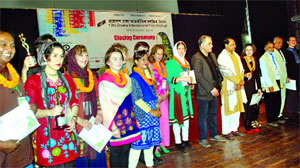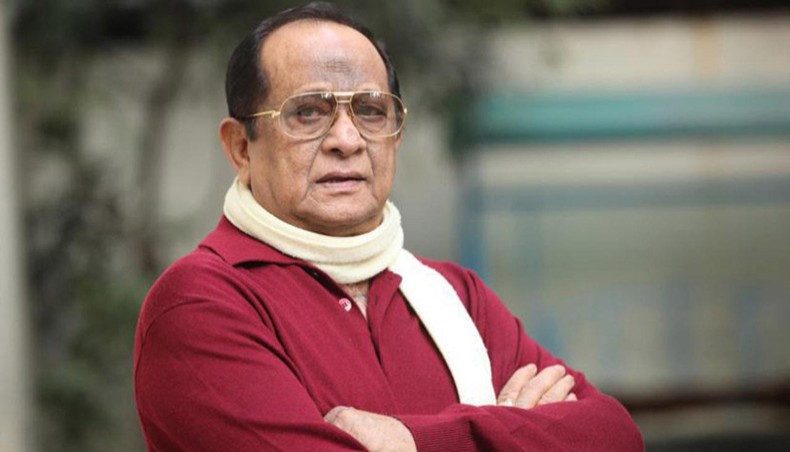Cultural Correspondent
The 13th Dhaka International Film Festival ended in the National Museum auditorium on Saturday with the jury failing to select the best film out of 23 entries of the main competition section this time.
Besides screening three mainstream local films including Humayun Ahmed’s Ghetu Putra Kamola, Redoan Rony’s Chorabali and Mostofa Sarwar Farooki’s Television, the section showcased 25 foreign films in festival, which basically promotes art house and independent films.
In the nine-day festival, around 150 films from 50 countries in five venues including the Central Public Library, two auditoriums of the Bangladesh National Museum, Alliance Francaise de Dhaka and EMK centre in Dhanmondi.
The festival featured a competition section for Asian and Australian cinema and segment categories for retrospective, cinema of the world, children’s film, women filmmakers’ films, short and independent films and spiritual films.
Films from Iran, India, Turkey, Germany, USA, Argentina, Iceland, Indonesia, Kosovo, Nepal, Netherlands and other joint productions of Europe participated in the section.
The jury composed of three foreigners and two Bangladeshis selected the Iranian filmmaker Parviz Shahbazi as the best director for his film Trapped. The Iranian actor Levon Hafevan and the Philippino actor Vilma Santos won the best actor and best actress awards for their performances in Parviz and Ekstra.
The Best Children Film Badal Rahman Award went to the Iranian film The Rooster Trademark Paper, directed by Maryam Milani.
Hiroyuki Tanaka won the best screenplay writer award for the Japanese film Miss Zombie while Geoffrey Simpson got the best cinematographer award for the Australian entry Satellite Boy.
Like the previous edition held in 2012, the organisers remained satisfied giving awards in rest of the five categories of the Australasian competition.
The organisers also gave awards in four other segments including children film section, spiritual section, women filmmakers section and short and independent films section.
The Best Fiction Award of the spiritual section went to the Indian film Adomya, directed by Baobby Sarma Burah, and the Best Fiction Award of the women filmmakers section went to the Swedish film Eat Step Die, directed by Gabriela Pilchler.
Two awards were given in the short and independent film section: the Best Documentary Award went to the Nepalese director Ashok Thapa Magar’s film The Korean Dream and the Best Fiction Award went to the Turkish director Onur Yagiz’s film Patika.
Information minister Hasanul Haque Inu handed over the awards to the winners as the chief guest of the closing ceremony.
‘It’s a pity that we could not select the best film from so many average entries’, said Kim Ji-Seok, a jury member of the Australasian competition section, at the award-giving ceremony.
The programme began with observing one minute silence in memory of the legendary Bengali actor Suchitra Sen, who died at the age of 82 in a Kolkata hospital on Friday. Following the award giving ceremony the closing film of the festival Television, directed by Mostafa Sarwar Farooki, was screened.
‘It’s ridicules that five men cannot select the best film,’ said, an audience at the programme.
Two Turkish films depict the psychological journey of people. Ruhi Karadag’s Simurgh is a film that portrays the opinions, hopes, and desire to drink tea under the great big sky of six friends who suffer from Korsakoff’s syndrome, having the difficulty of walking or talking; and Forgive Me directed by Cemil Agacikoglu is a story of a man with severe mental retardation who shapes his family’s life.
Another film from the country, Topragin Cocuklari directed by Ali Adnan Ozgur, depicts corruption through a story set in 1945, a time when village institutes of Turkey were increasingly subject to crackdowns of the evil intentions of the army personnel
But, the festival was not colourful like the previous years. ‘The participating films were not bad, but not good like the previous editions,’ said the Iranian filmmaker Rasoul Sadrameli, a jury member of the Australasian competition section, who had attended in the previous three editions of the festival.
The organisers also admit that the festival could be arranged more colourfully. ‘Due to sponsorship crisis, this year’s festival appeared pale. We had to cut many regular segments. But, we are very happy for arranging a successful workshop and an international conference on women cinema,’ Ahmed Muztaba Zamal, the festival director, told the media.
Source: Weekly H0liday










